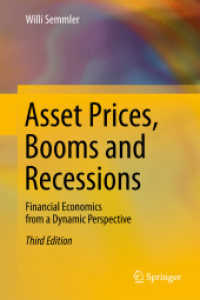- ホーム
- > 洋書
- > 英文書
- > Business / Economics
Full Description
Capitalism versus Pragmatic Market Socialism: A General Equilibrium Evaluation contains important contributions both to general economic theory and to the evaluation of potential market socialist economic systems. As a contribution to economic theory, the general equilibrium model utilized in the research introduces the concept of `capital management effort' as a third primary factor of production (in addition to labor and saving) provided by private households. Capital management effort represents such things as corporate supervision, investment analysis, entrepreneurship, and related activity by the household which is intended to increase the rate of return on its capital wealth. As a contribution to the evaluation of market socialism, this research sheds powerful illumination on the potential performance of a specific variant of market socialism known as `pragmatic market socialism'. Pragmatic market socialism is a plan of market socialism designed to work `almost exactly' like contemporary capitalism. The key differences would be the enforcement of a profit incentive on the publicly owned corporations by an agency designated the Bureau of Public Ownership, and the distribution of the preponderance of capital property return produced by the publicly owned corporations as a social dividend supplement to the household's wage and salary income. The analysis reported in this book shows precisely under what conditions pragmatic market socialism would perform better than capitalism, and under what conditions the opposite would be true. The fundamental implication forthcoming from the research is that the potential performance of pragmatic market socialism relative to capitalism is an empirical rather than a theoretical question.
Contents
1. Introduction and Overview.- 2. Pragmatic Market Socialism.- A. The Proposal.- B. Pros and Cons.- 3. A General Equilibrium Model.- A. Theoretical Specification.- B. Numerical Implementation.- 4. Results.- A. Benchmark Solutions.- B. Sensitivity Analysis.- 5. Summary and Conclusion.- Notes.- References.








